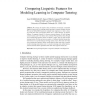Free Online Productivity Tools
i2Speak
i2Symbol
i2OCR
iTex2Img
iWeb2Print
iWeb2Shot
i2Type
iPdf2Split
iPdf2Merge
i2Bopomofo
i2Arabic
i2Style
i2Image
i2PDF
iLatex2Rtf
Sci2ools
AIED
2007
Springer
2007
Springer
Comparing Linguistic Features for Modeling Learning in Computer Tutoring
We compare the relative utility of different automatically computable linguistic feature sets for modeling student learning in computer dialogue tutoring. We use the PARADISE framework (multiple linear regression) to build a learning model from each of 6 linguistic feature sets: 1) surface features, 2) semantic features, 3) pragmatic features, 4) discourse structure features, 5) local dialogue context features, and 6) all feature sets combined. We hypothesize that although more sophisticated linguistic features are harder to obtain, they will yield stronger learning models. We train and test our models on 3 different train/test dataset pairs derived from our 3 spoken dialogue tutoring system corpora. Our results show that more sophisticated linguistic features usually perform better than either a baseline model containing only pretest score or a model containing only surface features, and that semantic features generalize better than other linguistic feature sets. Keywords. Tutoring Di...
AIED 2007 | Artificial Intelligence | Linguistic Feature | Linguistic Feature Sets | Sophisticated Linguistic Features |
Related Content
| Added | 07 Jun 2010 |
| Updated | 07 Jun 2010 |
| Type | Conference |
| Year | 2007 |
| Where | AIED |
| Authors | Katherine Forbes-Riley, Diane J. Litman, Amruta Purandare, Mihai Rotaru, Joel R. Tetreault |
Comments (0)

